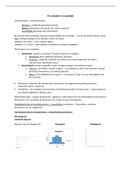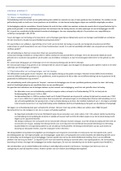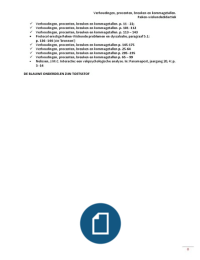Protection of human rights in international law
Weblectures komen net voor tentamen online.
Check if the country ratified the individual complaint mechanisms for the treaties!!
- Current debates, nuanced position.
- Sources, categories of rights, nature of state obligations.
- Explain and compare human rights mechanisms and their strengths and weaknesses.
- Relevant rights and sources + apply to a specific case.
PROTECTION OF HUMAN RIGHTS IN INTERNATIONAL LAW............................................................. 1
1. UNIVERSALITY OF INTERNATIONAL HUMAN RIGHTS LAW ................................................................................. 2
2. SOURCES ........................................................................................................................................................... 3
3. EQUALITY AND NON-DISCRIMINATION .............................................................................................................. 4
4. UNITED NATIONS: ............................................................................................................................................. 5
5. EUROPE ............................................................................................................................................................. 6
6. AFRICA ............................................................................................................................................................. 7
7. CIVIL AND POLITICAL RIGHTS ........................................................................................................................... 8
8. ECONOMIC, SOCIAL AND CULTURAL RIGHTS ..................................................................................................... 9
9. THE ENVIRONMENT ......................................................................................................................................... 10
10. COVID ........................................................................................................................................................... 10
, 1. Universality of international human rights law
History of human rights:
Human rights on the domestic plane: key dates:
1215 Magna Carta
1689 English Bill of Rights
(It’s significance lays in its confirmation of a fundamental idea, namely that the absolute power of the
State should be limited for the sake of the individuals within it).
1776 US Declaration of Independence
Virginia Declaration of Rights
1789 French Declaration of the Rights of Man and Citizen
US Constitution
1791 US Bill of Rights
Human rights in international law: key dates:
1941 Roosevelt’s Four Freedoms speech
- freedom speech and expression
- freedom of religion
- freedom from want
- freedom from fear
1942 Declaration of the UN
1945 UN Charter
1948 Universal declaration of human rights
Convention on the Prevention and Punishment of the Crime of Genocide
1949 Four Geneva Conventions
1966 ICCPR and ICESCR opened for signature
1976 ICCPR and ICESCR enter into force
Universality vs Cultural relativism
Universality:
Universalists believe that the same human rights should apply to everyone, regardless of their
culture or background. Human rights are the rights that one has because he is human. As such, they
are equal rights. But the rights have to be implemented by the states to become international
universal.
But the risk of imposing one’s own views and ways on others.
Cultural relativism:
Cultural relativist believe human rights should take account of cultural differences. They state that
values are defined by local culture as opposed to a global theory. Therefore there should be respect
for cultural practices.
But must all different values and practices be tolerated? And if culture can’t be criticized how can a
State move forward/change in culture?
Jack Donnelly: Relative Universality:
Different levels of universality and cultural relativism.
All human beings possess universal human rights (in theory) but their implementation and
enforcement is relative (in practice).
Weblectures komen net voor tentamen online.
Check if the country ratified the individual complaint mechanisms for the treaties!!
- Current debates, nuanced position.
- Sources, categories of rights, nature of state obligations.
- Explain and compare human rights mechanisms and their strengths and weaknesses.
- Relevant rights and sources + apply to a specific case.
PROTECTION OF HUMAN RIGHTS IN INTERNATIONAL LAW............................................................. 1
1. UNIVERSALITY OF INTERNATIONAL HUMAN RIGHTS LAW ................................................................................. 2
2. SOURCES ........................................................................................................................................................... 3
3. EQUALITY AND NON-DISCRIMINATION .............................................................................................................. 4
4. UNITED NATIONS: ............................................................................................................................................. 5
5. EUROPE ............................................................................................................................................................. 6
6. AFRICA ............................................................................................................................................................. 7
7. CIVIL AND POLITICAL RIGHTS ........................................................................................................................... 8
8. ECONOMIC, SOCIAL AND CULTURAL RIGHTS ..................................................................................................... 9
9. THE ENVIRONMENT ......................................................................................................................................... 10
10. COVID ........................................................................................................................................................... 10
, 1. Universality of international human rights law
History of human rights:
Human rights on the domestic plane: key dates:
1215 Magna Carta
1689 English Bill of Rights
(It’s significance lays in its confirmation of a fundamental idea, namely that the absolute power of the
State should be limited for the sake of the individuals within it).
1776 US Declaration of Independence
Virginia Declaration of Rights
1789 French Declaration of the Rights of Man and Citizen
US Constitution
1791 US Bill of Rights
Human rights in international law: key dates:
1941 Roosevelt’s Four Freedoms speech
- freedom speech and expression
- freedom of religion
- freedom from want
- freedom from fear
1942 Declaration of the UN
1945 UN Charter
1948 Universal declaration of human rights
Convention on the Prevention and Punishment of the Crime of Genocide
1949 Four Geneva Conventions
1966 ICCPR and ICESCR opened for signature
1976 ICCPR and ICESCR enter into force
Universality vs Cultural relativism
Universality:
Universalists believe that the same human rights should apply to everyone, regardless of their
culture or background. Human rights are the rights that one has because he is human. As such, they
are equal rights. But the rights have to be implemented by the states to become international
universal.
But the risk of imposing one’s own views and ways on others.
Cultural relativism:
Cultural relativist believe human rights should take account of cultural differences. They state that
values are defined by local culture as opposed to a global theory. Therefore there should be respect
for cultural practices.
But must all different values and practices be tolerated? And if culture can’t be criticized how can a
State move forward/change in culture?
Jack Donnelly: Relative Universality:
Different levels of universality and cultural relativism.
All human beings possess universal human rights (in theory) but their implementation and
enforcement is relative (in practice).










